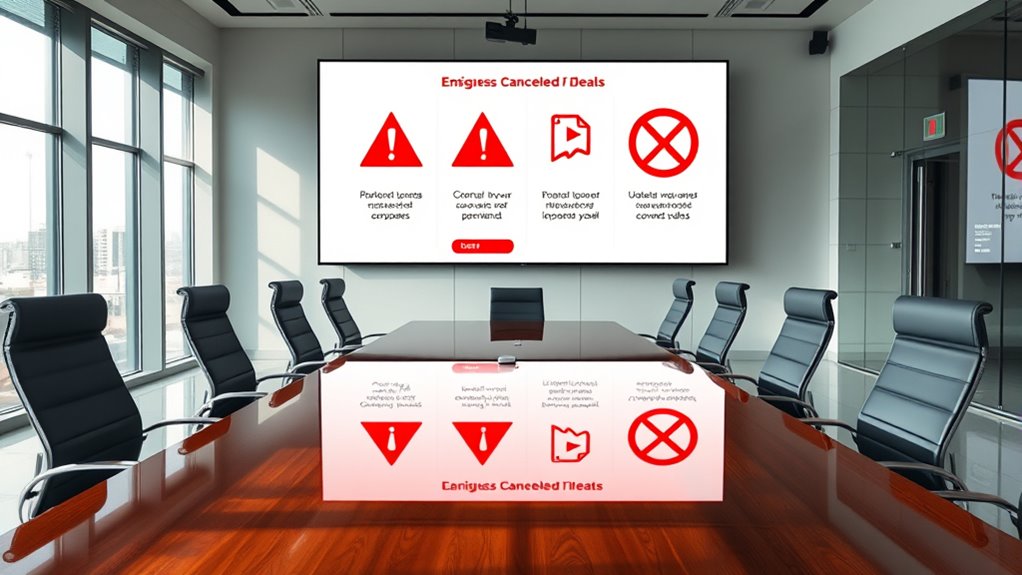In 2025, deal cancellations surged by over 15%, highlighting a growing risk in business negotiations. Many companies find themselves caught off guard, often due to overlooked warning signs that could have been spotted early. Recognizing these red flags can make the difference between closing a deal and watching it fall apart. Want to learn how to spot these signals before it’s too late? Keep going to understand what to watch for.
Key Takeaways
- Early warning signs like vague clauses or inconsistent communication indicate potential deal fragility.
- Rushed negotiations and skipping thorough contract vetting increase cancellation risks.
- Ambiguous contract language and overlooked minor obligations can lead to future disputes.
- Analyzing cancellation trends helps identify industries or deal types prone to cancellations.
- Building transparency and clear terms during negotiations enhances deal resilience against market shocks.

In 2025, deal cancellations surged across industries, reshaping the business landscape and leaving many companies reeling. As you navigate this volatile environment, understanding the red flags that signal a deal might fall through becomes more essential than ever. One common mistake you might encounter is falling into signing pitfalls—those overlooked issues during contract negotiations that can derail deals later on. These pitfalls often stem from rushing the signing process without thoroughly vetting terms or failing to clarify key details upfront. If you overlook minor clauses or accept vague language, you risk unexpected obligations or disagreements that could lead to deal cancellations down the line. Recognizing these pitfalls early means paying close attention to contract language, asking detailed questions, and not rushing into signatures just to close a deal quickly. Additionally, contract language plays a crucial role in ensuring clarity and avoiding misunderstandings that could threaten the deal’s stability. Equally important are your negotiation tactics. In a competitive climate, some might be tempted to push too hard or accept unfavorable terms to seal the deal. However, aggressive tactics can backfire, creating friction or mistrust that makes cancellation more likely if circumstances change. Instead, you should focus on collaborative negotiation styles that emphasize mutual benefit. Building rapport and demonstrating flexibility can help you identify deal-breaking issues before they become deal killers. It’s essential to listen carefully, understand the other party’s priorities, and be prepared to adapt your approach. When you approach negotiations with transparency and a problem-solving mindset, you’re more likely to reach agreements that withstand market shocks or internal shifts, reducing the chance of cancellations. It’s also wise to be alert for red flags during negotiations, such as inconsistent communication, vague commitments, or rushed decision-making. These signals often hint that a deal is fragile or that one side might back out if conditions aren’t perfect. By spotting these early warning signs, you can address concerns proactively—perhaps by adding safeguards or clarifying terms—rather than waiting until it’s too late. Remember, successful deal-making isn’t just about closing fast but about building durable agreements. When you understand common signing pitfalls and refine your negotiation tactics, you position yourself to steer clear of canceled deals and foster stronger, more resilient partnerships. In a year where cancellations are on the rise, being vigilant and strategic in your approach can make all the difference in securing sustainable success.
Conclusion
By now, you’ve seen how red flags can turn promising deals into disaster zones in 2025. If you ignore warning signs like rushed talks or vague contracts, you’re risking more than just a lost deal—you could be sabotaging your entire business empire. Stay vigilant, ask tough questions, and build trust from the start. Remember, missing these signs is like sailing into a storm blindfolded—you won’t just lose a deal; you could lose everything.









